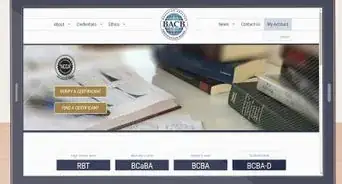This article was co-authored by Michael R. Lewis. Michael R. Lewis is a retired corporate executive, entrepreneur, and investment advisor in Texas. He has over 40 years of experience in business and finance, including as a Vice President for Blue Cross Blue Shield of Texas. He has a BBA in Industrial Management from the University of Texas at Austin.
This article has been viewed 54,700 times.
Corporate investigators apply detective skills and an understanding of corporate policy and structure to solve cases of corporate fraud and misconduct. For the right candidate, this job can provide exciting and rewarding work without the risks that come with other types of investigative work. However, in order to get this job, you will need the proper training, which typically includes training in criminal justice, knowledge of accounting and auditing procedures (including an understanding of financial statements), and an understanding of corporate practices. Use the following steps to train for and locate work as a corporate investigator.
Steps
Deciding to Become a Corporate Investigator
-
1Understand what corporate investigators do. Corporate investigators investigate different types of allegations, criminal frauds, irregularities in accounts, electronic crime, embezzlement, information leaks, drug use, and other criminal activities that are suspected to have taken place within a corporation. They are eligible to perform internal as well as external investigation activities for the organization.
- Internal investigations include the activities performed inside the company to check expense account abuse, drug abuse by employees, or other crimes committed by employees or on company premises.
- External investigation activities include checking the criminal activities done outside the company, like fraudulent actions taken by customers or suppliers to the corporation.[1]
-
2Determine whether you can fulfill the demands of the job. Corporate investigators are required to have a multifaceted skill set that they can use to investigate a case from every conceivable angle. This means you not only need to have the people skills to interview and assess the reactions of employees but also the technical skill to comb through accounting and computer records. You will also need a large degree of patience and determination, as investigations can sometimes stretch on for long periods of time.[2] [3]Advertisement
-
3Consider the employment outlook for corporate investigators. Before becoming a corporate investigator, you should see whether or not the market is ready for more of them. Currently, the job market for this job is experiencing healthy growth and is expected to grow another 22 percent by 2018. As for salary expectations, in 2015 the average corporate investigator made $83,000. However, the exact pay you can expect varies based on your experience, employer, and location.[4]
-
4Look into similar, alternative careers. There are many other jobs that require similar skills and possess responsibilities similar to those of a corporate investigator. For example, auditors review accounting records for errors or mishandled financial reporting. Financial examiners look at the same documents but do so to check compliance with federal financial regulations. These careers are good options for those who enjoy the financial investigation aspect of the corporate investigator's job.
- Other options include more traditional police and detective work and becoming an insurance claims investigator.[5]
Getting Qualified
-
1Assess your current experience and qualifications. Corporate investigators come from a variety of backgrounds. Successful investigators often come over from public law enforcement or accountancy, but recent college graduates are also accepted. If you are not trained in any type of business analysis, fraud detection, or criminal justice, you may want to seek additional education or experience in a related field before pursuing work as a corporate investigator.
- Other prospective investigators can come from legal, insurance adjustment, or financial backgrounds.[6]
-
2Meet the minimum educational requirements. Corporate investigators are typically required to hold a bachelor's degree from an accredited university. Regardless of the major, they are expected to at least have some coursework in finance, accounting, and/or business. Typical majors include criminal justice and political science, as well as more business-focused majors. These degrees are available from many different public and private educational institutions.[7]
-
3Obtain additional education. It is not required, but some corporate investigators, especially those focused on computer forensics or financial investigations, hold graduate-level degrees or certifications. For example, financial investigators often possess the certified public accountant (CPA) designation. Computer forensic specialists may hold a master's degree in computer science or computer forensics. While these degrees may make you a more competitive candidate, they are by no means required.[8]
-
4Get licensed. In most states, corporate investigators must be licensed to legally perform their duties. These requirements, and the task required to obtain the license, vary by state. In general, you will need to pass a written exam and background check in order to get the certification. You may also need a certain level of education or amount of experience.
- Several states that do not require licenses at the state level do so at the local level.
- The agency or bureau in charge of corporate investigator licensing varies by state.
- Even when a license is not required, a corporate investigator may wish to get a private investigator (PI) license so that they can legally employ certain investigation strategies.[9]
Gaining Experience
-
1Apply for internships. Search online for corporate investigation internships. There are many small corporate investigation firms spread out across the world, so locating at least one that needs some help should not be difficult. Keep in mind that these internships, like many others, may be unpaid. However, you need to decide if the experience gained is worth the cost of working for free.
-
2Locate and apply for corporate investigator jobs. When you are sufficiently educated and qualified, it is time to search for corporate investigator jobs. There are a variety of employer options in both the public and private sectors. For example, private corporate investigation firms, such as Kroll and K2, along with a number of smaller firms, continue to grow and hire more investigators around the world.[10] Corporations may also have internal investigation groups, which hold investigators on retainer for investigations of their own company.[11]
- In the public sector, a variety of federal organizations and bureaus have corporate investigation teams. For example, the IRS has a criminal investigation unit that investigates tax fraud by corporations.
-
3Go through on-the-job training. Corporate investigators typically learn most of their trade through on-the-job training provided after they are hired. This training may include topics like finance, business practices, and management structures. New hires are commonly paired with experienced investigators on cases until they are ready to tackle cases on their own.[12]
-
4Keep up with new developments. Business technologies and regulations are constantly changing, so an effective corporate investigator must undergo regular training and continuing education to ensure that they remain effective. Be sure to take advantage of any of these opportunities offered by your employer or by a third party. This is especially true for those who specialize in or frequently use computer forensics.[13]
References
- ↑ http://collegemouse.com/jobs/how-to-become-a-corporate-investigator.html
- ↑ http://www.csoonline.com/article/2124800/investigations-forensics/internal-investigations--the-basics.html
- ↑ http://www.bls.gov/ooh/protective-service/private-detectives-and-investigators.htm#tab-4
- ↑ http://collegemouse.com/jobs/how-to-become-a-corporate-investigator.html
- ↑ http://www.bls.gov/ooh/protective-service/private-detectives-and-investigators.htm#tab-8
- ↑ http://www.bls.gov/ooh/protective-service/private-detectives-and-investigators.htm#tab-4
- ↑ http://www.bls.gov/ooh/protective-service/private-detectives-and-investigators.htm#tab-4
- ↑ http://www.bls.gov/ooh/protective-service/private-detectives-and-investigators.htm#tab-4
- ↑ http://www.bls.gov/ooh/protective-service/private-detectives-and-investigators.htm#tab-4
- ↑ http://www.economist.com/node/21569028
- ↑ http://www.bls.gov/ooh/protective-service/private-detectives-and-investigators.htm#tab-4
- ↑ http://www.bls.gov/ooh/protective-service/private-detectives-and-investigators.htm#tab-4
- ↑ http://www.bls.gov/ooh/protective-service/private-detectives-and-investigators.htm#tab-4












-Step-9.webp)





















-Step-9.webp)





































